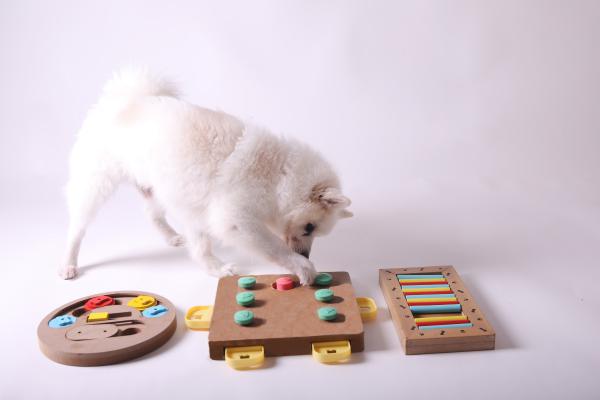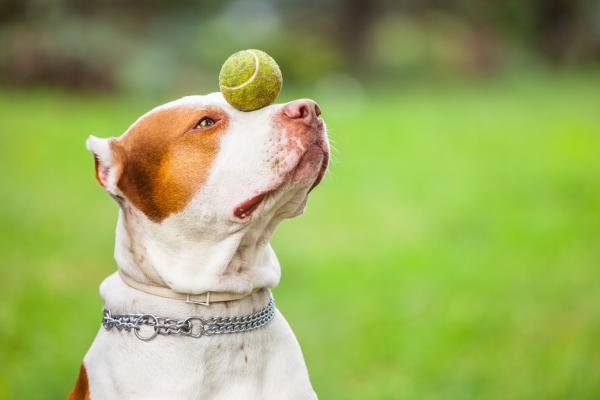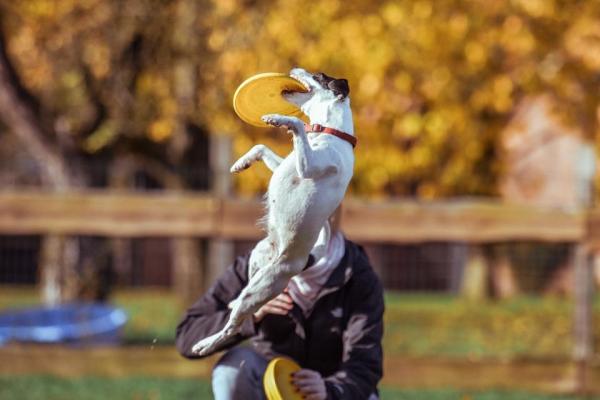
Is your dog not playing like they used to? Understanding why your dog won't play is the first step toward helping them enjoy this essential activity again. Because yes, play is vital for a dog's wellbeing. In fact, experts recommend that dogs enjoy a rewarding play session with their owner every day.
In this article, we'll explore the most common reasons why your dog doesn't want to play and provide practical advice to boost their motivation and enjoyment.
The importance of play behavior in dogs
Play isn't just a fun activity, it's fundamental to your dog's development and wellbeing. In fact, the first playful interactions begin early in a dog's life, with puppies showing initial play behaviors before they even hit the 3-week mark.
Each playful interaction triggers a series of beneficial neurochemicals in your dog's brain. Play releases dopamine and endorphins, which are nature's feel-good chemicals, while simultaneously reducing stress hormones like cortisol.
This neurochemical cocktail actually shapes developing brains in puppies and helps maintain neural plasticity in adult dogs. Some veterinary behaviorists now suggest regular play might even help delay cognitive decline in senior dogs, functioning as a kind of "brain gym" that keeps mental faculties sharp.
Each successful play interaction reinforces neural pathways involved in reading body language, developing emotional intelligence, and practicing self-control. A dog who gives and receives clear play signals typically develops better impulse control and social skills overall.
Through play, dogs learn appropriate social behavior, develop physical coordination, experience mental stimulation, and build bonds with their human family members. Regular play also helps prevent behavioral problems that often emerge from sheer boredom and understimulation.
Play is not only important during the developmental stages because, for adult dogs, play continues to provide:
- Physical exercise that helps maintain healthy weight
- Mental stimulation that can slow cognitive decline
- Stress relief and emotional balance
- Stronger connection with their human family
When a dog doesn't want to play, it typically signals that something in their physical or emotional world has shifted. In the following sections, we will explore the possible reasons behind this shift in behavior.
Having the opposite problem? If your furry friend plays a bit too enthusiastically, discover effective ways to encourage gentler interactions in our article on managing overly rough play behaviors.

Why doesn't a dog want to play?
The reasons behind play reluctance typically fall into several interconnected categories that reflect how deeply intertwined a dog's physical, emotional, and environmental experiences truly are.
Pain or discomfort:
If your dog in pain won't play, this could be one of the first signs something is wrong. Dogs experiencing joint pain, dental issues, or internal discomfort will often withdraw from play activities they previously enjoyed. Look for other signs like limping, difficulty getting up, or whining when touched in certain areas.
Fatigue or illness:
A tired dog won't play and may show other symptoms like lethargy, reduced appetite, or increased sleeping. Various illnesses, from minor infections to more serious conditions, can cause your dog to lose interest in play. It is important to monitor for additional symptoms like coughing, vomiting, or changes in bathroom habits.
Age:
An older dog not playing as much is common but shouldn't be dismissed entirely as "just aging." While senior dogs naturally become less playful, sudden disinterest could signal cognitive changes or physical discomfort that should be evaluated. Conversely, very young puppies alternate between intense play bursts and long sleep periods. If a puppy not playing is your concern, ensure they're getting enough rest and aren't overwhelmed.
Anxiety or fear:
An anxious dog won't play and may exhibit other stress signals like pacing, excessive panting, or hiding. It is important to note that fear can stem from past negative experiences, lack of socialization, or environmental changes.
Lack of socialization:
Dogs who weren't properly socialized during critical developmental periods (3-14 weeks) may never have learned how to play appropriately. This is especially common in rescue dogs who may have missed these key learning experiences.

Boredom with current toys:
Sometimes a dog doesn't want to play because they're simply bored with their current toys. Dogs, like humans, appreciate novelty and can lose interest in the same old toys.
Environmental factors:
Your dog might not want to play outside if the environment feels threatening or uncomfortable. Weather extremes, loud noises, unfamiliar locations, or the presence of intimidating animals can all suppress play behavior.
Breed:
Different breeds have varying play drives and preferences. Working breeds often engage in more active, extended play, while some companion breeds may prefer shorter, less intense play sessions.
Understanding these distinctions helps you address the right underlying issue rather than treating symptoms. A dog who's bored with toys needs a different solution than one who's anxious about playing, though the surface behavior looks the same.

What should I do if my dog doesn't want to play? How can I motivate him?
The approach that works best depends entirely on why your dog stopped playing in the first place, which is why the previous section matters so much. There's no one-size-fits-all solution here since what works brilliantly for a dog who's bored with their toys might completely backfire with a dog who's avoiding play due to anxiety or discomfort. The good news? Most dogs retain their capacity for play throughout life, even if it seems temporarily dormant.
Let's explore practical strategies that can help transform your reluctant player back into an enthusiastic playmate.
- Rule out health issues: if your dog suddenly stopped playing, a veterinary check-up should be your first step. Many health issues can cause a decrease in playfulness, and early detection is vital for successful treatment.
- Identify the underlying cause: understanding why your dog doesn't want to play will help you tailor your approach. Observe when the behavior started, what might have changed in their environment, and any other behavioral changes.
- Try different types of play: experiment with different toys to see what encourages your dog to play with toys. Some dogs prefer fetch, others tug-of-war, while some enjoy puzzle toys. Rotate toys regularly to maintain novelty and interest.
- Socialize with other dogs: for many dogs, the best motivation comes from their own kind. If your dog enjoys canine company, arrange playdates with compatible dogs or visit dog parks (if your dog is properly socialized). Watching the play behavior of other dogs can stimulate your dog's interest.
Finally, it is important to offer your dog engaging toys. The market offers countless dog toys designed for different play styles and preferences:
- Activity balls and frisbees for fetch-loving dogs.
- Tug ropes for interactive play.
- Puzzle toys that dispense treats to tap into natural foraging instincts.
- Squeaky toys for prey-drive motivation.
- Plush toys for gentler players.
Always ensure play sessions end on a positive note. Use treats, praise, and excitement to reinforce that playing is fun and rewarding. Never punish or show frustration during attempts to engage your dog. Especially for dogs with little play experience, learning to play can take time. Keep sessions short and positive at first, gradually extending them as your dog's interest grows.
Looking for budget-friendly ways to spark your dog's interest in play? Discover how to create engaging playthings from household items in our other article.

When to be concerned about your dog not playing
As mentioned earlier, if your dog suddenly stops playing when they used to enjoy it, this could signal a health issue. Similarly, if your dog shows other symptoms like lethargy, loss of appetite, or unusual behavior along with a lack of interest in play, a veterinary visit is recommended.
For rescue dogs, especially those with unknown histories, patience is key. Some may never have learned to play or may associate play objects with negative experiences. In these cases, professional help from a certified dog trainer or animal behaviorist might be beneficial.
Remember that every dog is unique. Some dogs naturally play less than others due to their temperament, breed characteristics, or past experiences. This is why it is so important to understand your individual dog's preferences and needs is crucial for fostering a happy relationship.
If you want to read similar articles to Why Won't My Dog Play With Me?, we recommend you visit our Animal games and fun category.
- Center for Shelter Dogs. (2023). Enrichment for dogs. Cummings School of Veterinary Medicine at Tufts University.
- Millan, C., & Peltier, M. J. (2021, June 28). Why isn't my dog playing? Cesar's Way.